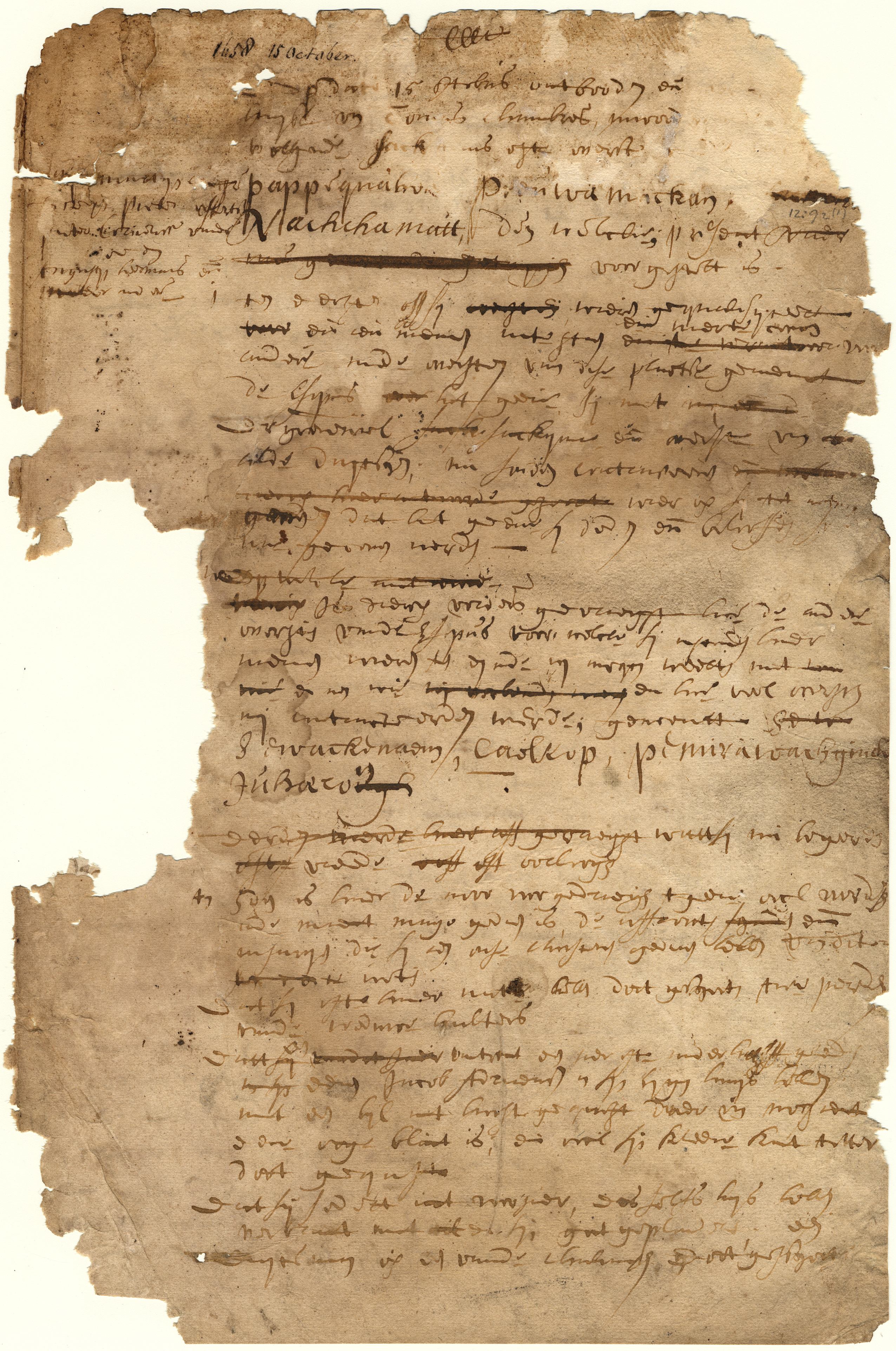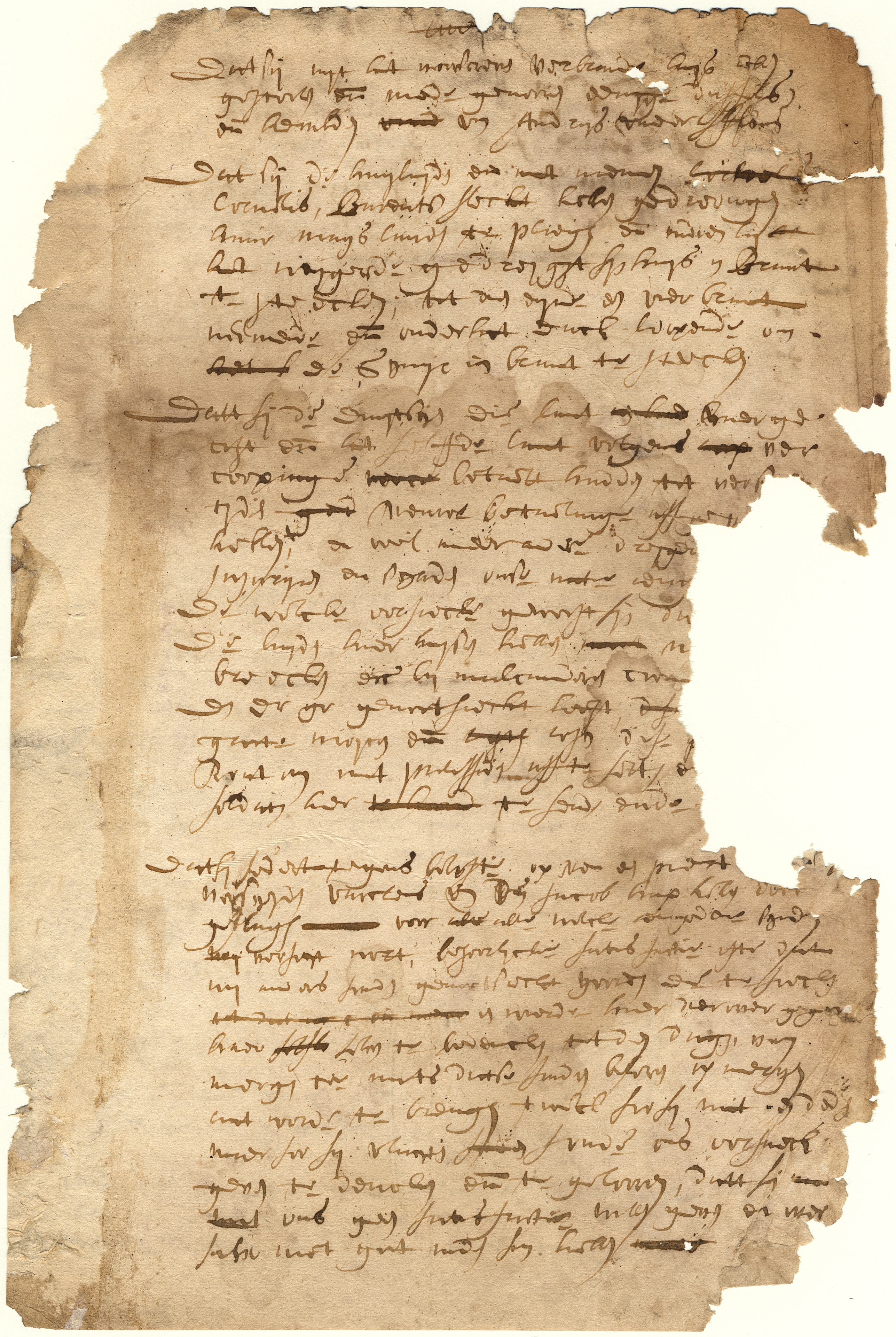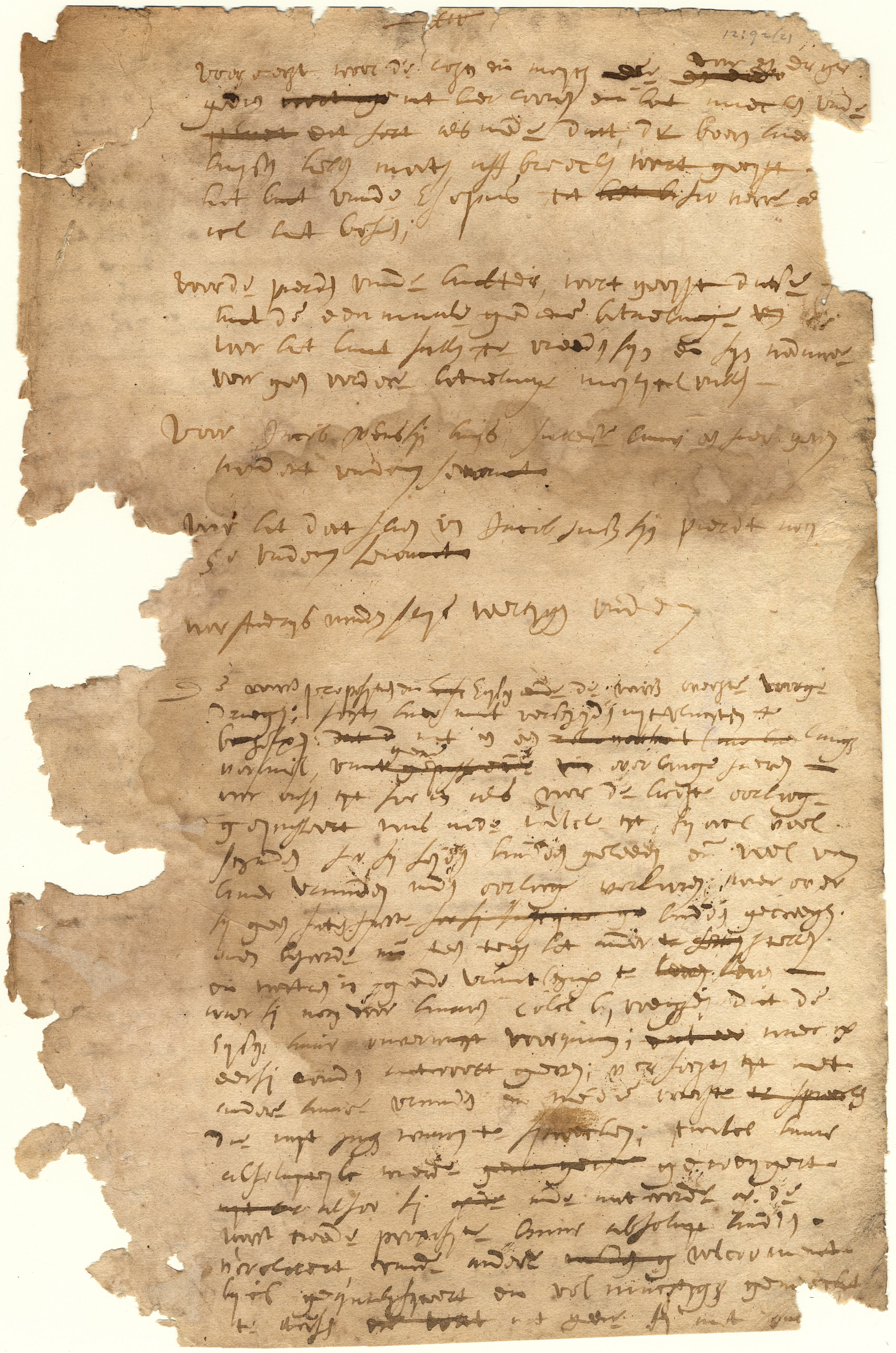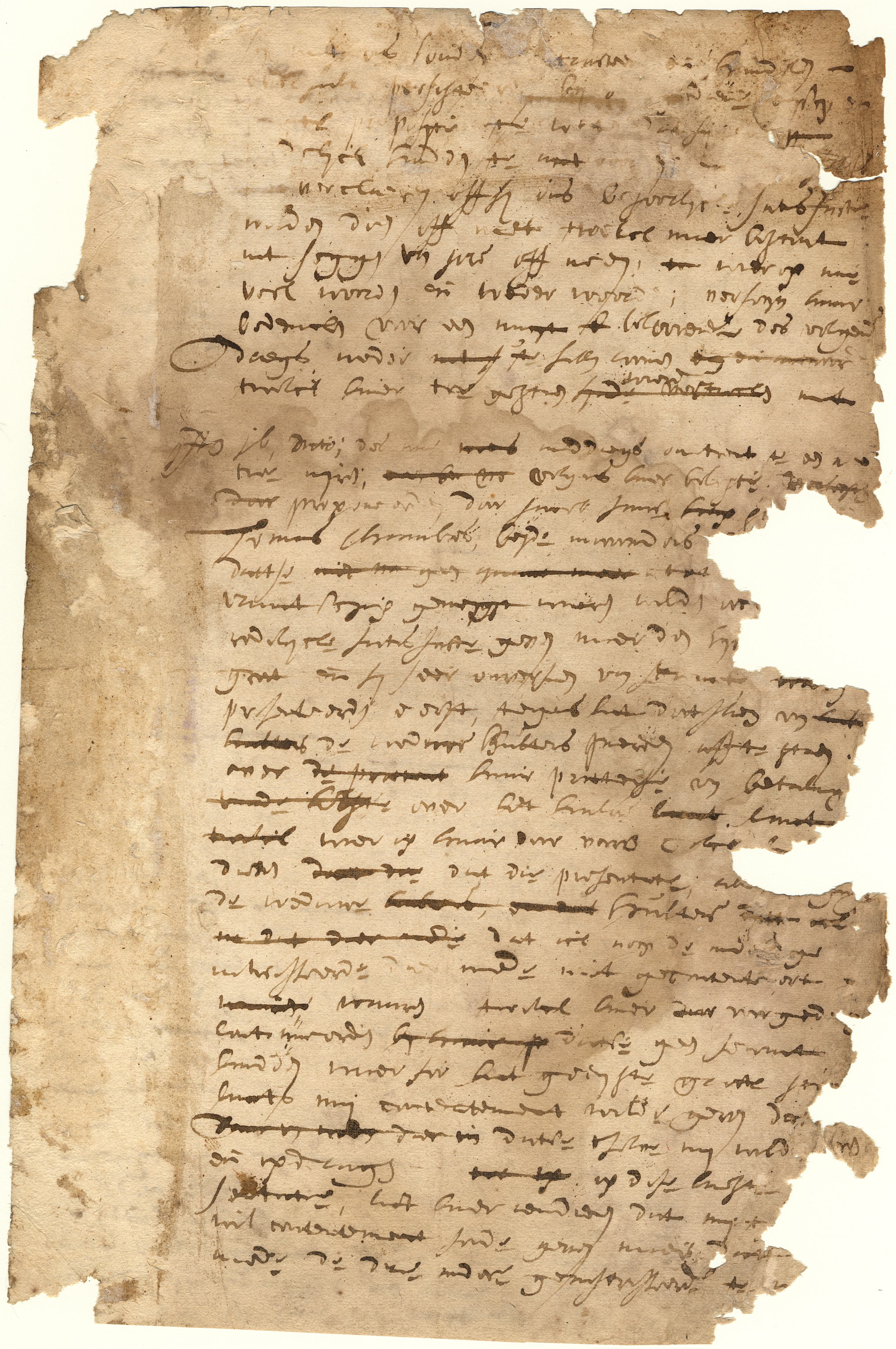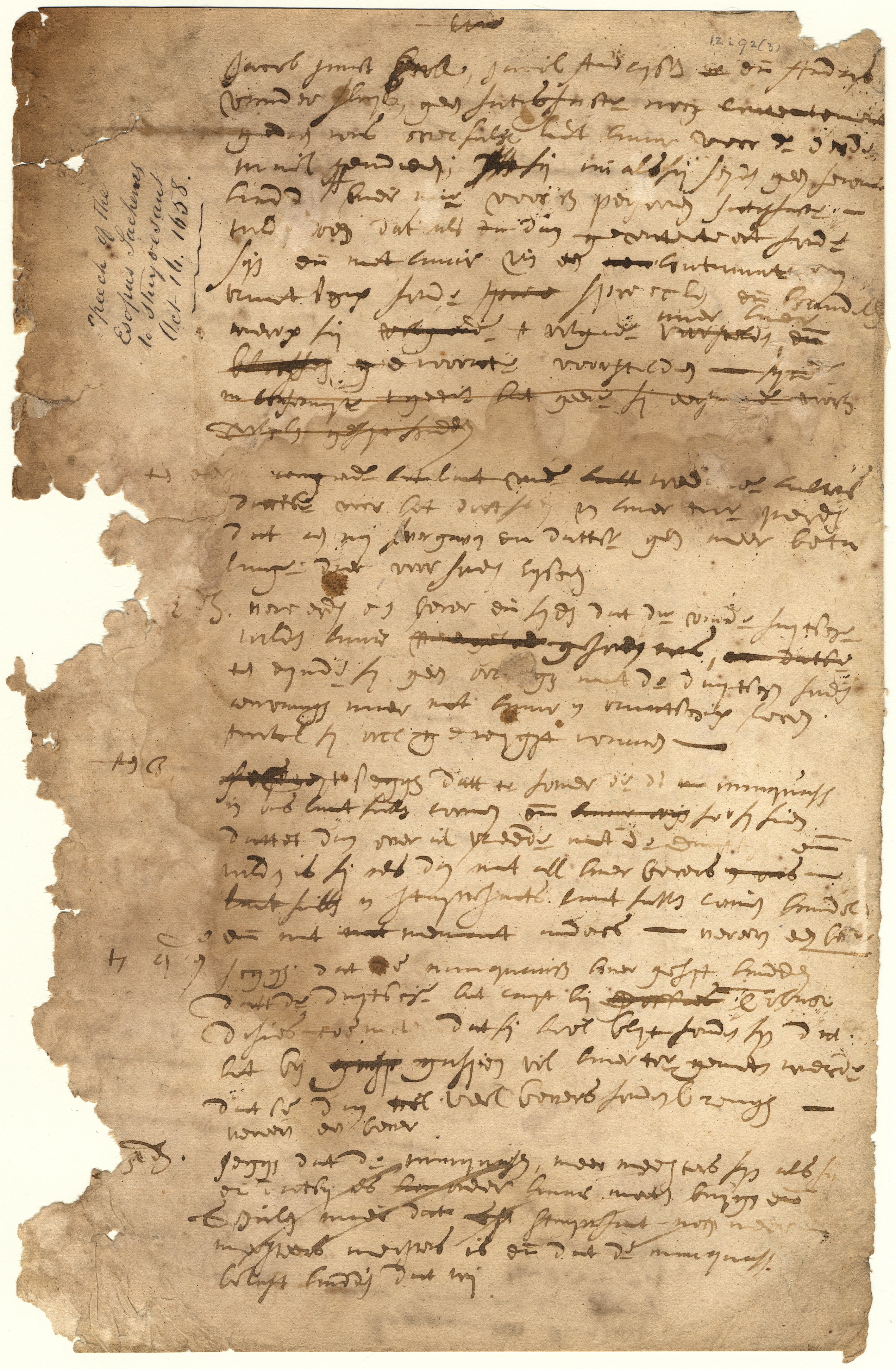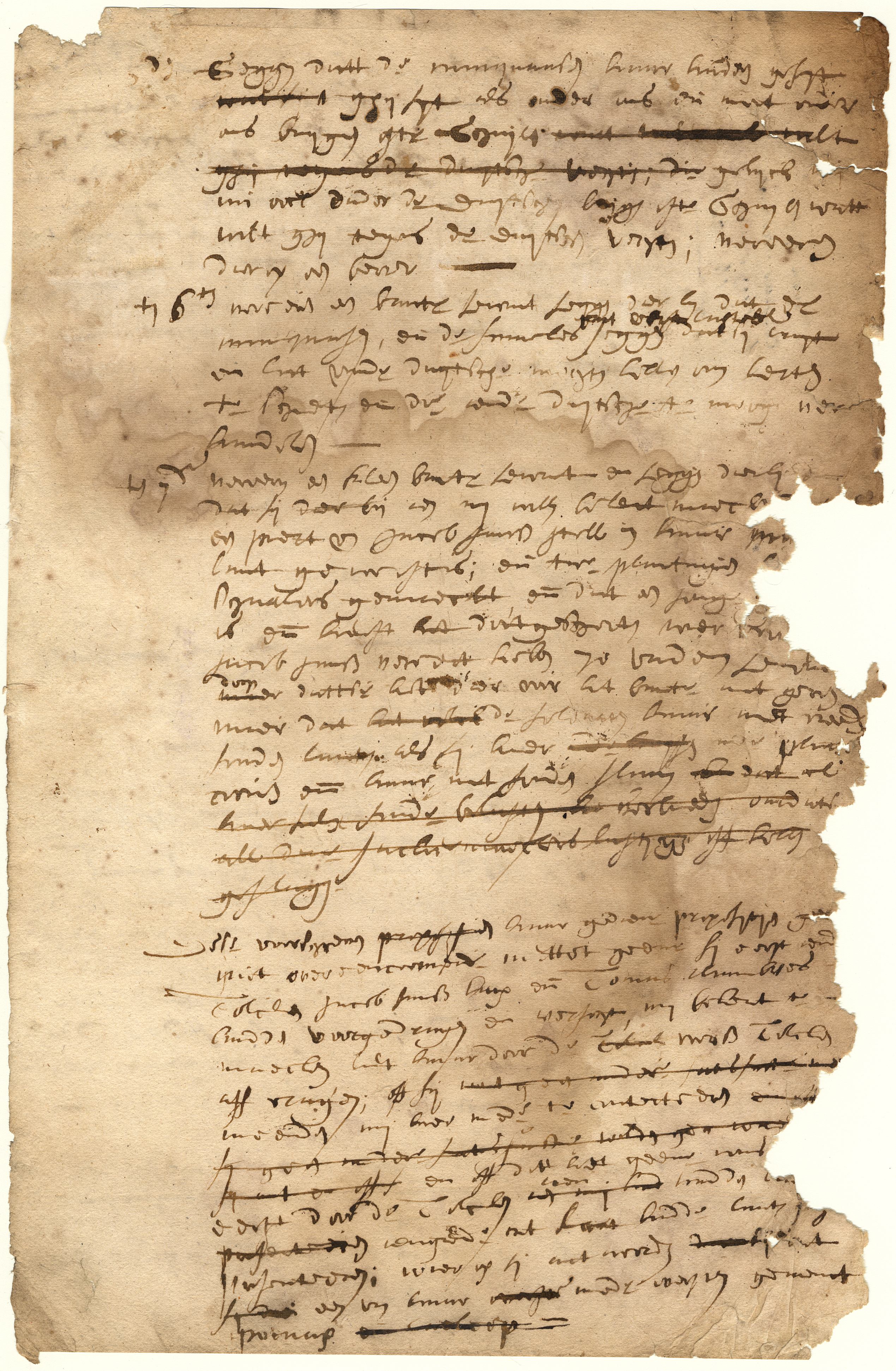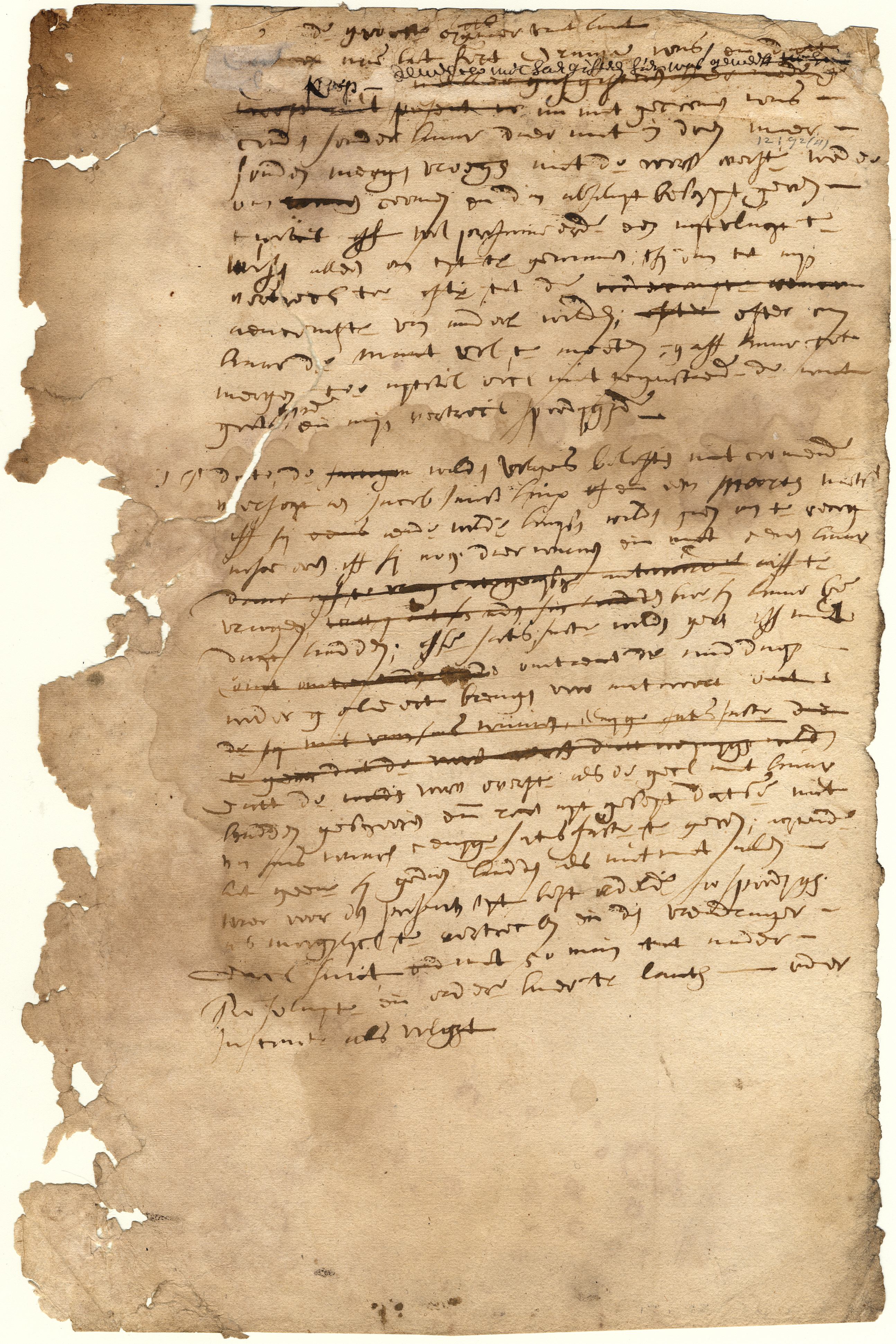Today the 15th of October anno 1658.[1]
We summoned and there appeared at the house of Thomas Chambers, a resident at the Esopus, several sachems or chiefs of the Indians, namely Pappequahon, Preuwamackan and Nachchamatt, to whom the following propositions were made in the presence of Captain Marten Cregier, Schepen Pieter Wolphertsz, Pieter Cornelisz van der Veen, Augustijn Hermans, and others.
First, whether they were authorized and willing to carry out what they now agree upon on behalf of the other chiefs of this place, called Esopus, with the director general, the sachem and chief of all the Dutch; to which they answered that, what they did and promised, would be carried out.
2nd. They were then asked, what were the names of the other chiefs of the Esopus, for whom they answered, so that we might know, with which and how many chiefs we made the compact. Sewackenaem, Caelcop, Pemirawachginck, Juhoeron were named.
3rd . Then the affronts and injuries, which they had done to our Christians, were again represented to then, as it had been done in the month of May, to wit: that they or their tribe had killed two horses of the widow Hulter.[2]
That about year or eighteen months ago they had wounded with a hatchet one Jacob Adriaensz on the head, while in his own house, in consequence of which he is still blind in one eye and they had also mortally wounded his little child.
That since the spring they had burned his house and plundered his goods; shot to death a Dutchman on one of the sloops.
That they had stolen and taken with them from the aforesaid burned house some duffels and shirts of Andries van der Sluys.
That they had forced the farmers, namely Cornelis Barentsen Slecht, to plow their land for corn and had threatened to burn his house, in case he should refuse, taking a firebrand for that purpose and walking up under the roof to torch the barn.
That they had extorted at different times new payments from the Dutch, who had bought land from them and had paid for it according to the bill of sale and had inflicted many more threats, affronts and damages upon our nation, which have been the cause that the people have been obliged to pull down their houses and to move close together and that the director general has been forced to enclose this place with palisades with great labor and expense and to send and keep here so many soldiers.
That since they have killed again, contrary to their promise, a horse and several hogs, belonging to Jacob Hap, for all of which losses and damages caused by them, proper satisfaction is demanded or else we shall be forced to seek other means; and time was given them to consult about it until tomorrow, provided they would promise to give an answer tomorrow; if they did not do this, but were to flee, they would give us cause to think and believe that they did not wish to give us satisfaction and therefore had nothing good in mind.
First, the land from the Esopus so far as I have viewed it, is demanded for the expenses and troubles incurred by the director general in coming here and establishing this fort, also because the farmers have had to pull down their houses.
For Hulter' s horses we demand that they should be satisfied with the payment once made for the land and not trouble his widow again about another payment.
They shall give within one year one hundred fathoms of sewant for the house of Jacob Neus; for the killing of Jacob Jansen's horse 50 fathoms of sewant.
For Andries van der Sluys forty fathoms.
After the aforesaid propositions and demands had been stated to the said chiefs, they tried to avail themselves of many subterfuges and told a long tale of what had happened many years ago, before our time, in and before the last war, when, as they said, they had suffered great losses and had lost many of their friends in the wars; for which they had received no satisfaction; but now one ought to be balanced with the other and people ought to live in friendship. They added hereto by their interpreter that the demands had surprised them and they asked for time to consult with others of their friends and fellow chiefs who were out hunting, before they could give an answer; this was absolutely refused, as in their reply to the foregoing second proposition they had absolutely declared themselves to be qualified and authorized for what they should contract and transact with us. We therefore persisted in the demands made by us and in the last proposition, to wit, that they should promptly answer now and declare themselves, whether they would give us proper satisfaction or not, the answer to which was only yes or no. Whereupon after many discussions they requested to consult over night, promising to come again the next day; this was granted to them.
On the 16th, at about one or two o'clock in the afternoon, they stated, according to promise, through Jacob Jansen Stol and Thomas Chambers, both residents at the Esopus that they were inclined to peace and friendship, and would give also fair satisfaction, but our demands were too great and they are badly provided with sewant. They offer first, in compensation for the killing of Widow Hulter' s horses, to desist from their claims for payment as to one half of the land, whereupon we informed them by the said interpreters that the offer concerned only the Widow Hulter that neither I nor the other parties in interest were satisfied with it; when this had been communicated to them, they repeated that they had no sewant, but if the demanded large tract of land would satisfy me, they would give and convey it to me:I had them answered upon this last offer that it would satisfy me, but that the three other interested parties, namely Jacob Jansen Stol, Jacob Andriesen, and Andries van der Sluys did not receive any satisfaction nor compensation for it and therefore I had them asked a third time, whether, as they said, they had now no sewant, they would not satisfy the aforesaid persons hereafter that then I should be satisfied and talk and treat with them about the continuation of our friendship, whereupon they stated the following according to their custom.
1st. As to the land of Widow Hulter, they conveyed it over to me for the killing of her two horses and would not demand any further payment for it.
2nd. They presented a beaver and said that it was sent here by the Southern Indians for the purpose that they should not begin a war with the Dutch, but live in friendship with them, which they were inclined to do.
3rd. They say that the Minquaes[3] will come into our land in the summer and when they see that there is everywhere peace between the Dutch and the Indians, then they will come with all their beavers to Stuyvesant's land to trade there and with nobody else; they present a beaver.
4th. They say that the Minquaes had told them, the Dutch measured the powder with tobacco boxes. They would be very glad, if it were measured to them by the handful; they would then bring many beavers. They present a beaver.
5th. They say that the Minquaes had told them, you are our subjects and have to submit to us or hide yourselves, as we also have to submit to the Dutch or hide; why do you want to fight against the Dutch. They present a beaver.
6th. They present a belt of sewant, saying that the Minquaes and the Sinnekes[4] of the first castle say that they would like to have powder and lead from the Dutch to shoot deer with and trade these to the Dutch.
7th. They present a small belt of sewant, saying that they desire to inform me that a horse of Jacob Jans Stoll has been in their cornfield and has damaged two plantings and that a boy came and shot it dead, for which they gave to Jacob Jansz 70 fathoms of sewant; but they do not give this small belt on that account, only that the soldiers should leave them in peace, when they come to this place and not beat them.
As the foregoing statement made by them did not agree with that which they had first made to the interpreters Jacob Jansz Hap and Tomas Chambers and asked, I should be informed of it, I asked them through the said interpreters, whether they intended to satisfy me thereby and whether it was this which they had first offered through the interpreters regarding the land; whereupon they answered that one of their fellow chiefs, called Poenap, the greatest landowner, had gone to Fort Orange and that Caelcop, who had been here with them yesterday, had not come now, they could therefore do nothing herein, but would come again with the said chief tomorrow morning and give a conclusive answer, which although I thought to be a subterfuge only, to gain time either until my departure or until the arrival of other Indians, yet to give them full measure, I allowed them this delay until tomorrow, notwithstanding that the wind was favorable and my departure necessary.
As the Indians did not come on the 18th according, to their promise, I asked Jacob Jansz Hap and Marten Metselaer whether they would not go to the houses of the Indians to reconnoitre whether they were there still and then to ask what conclusion they had come to; whether they would give satisfaction or not. They returned about noon and brought as answer that the said chiefs had played them for fools and had plainly said that they had no intention of giving satisfaction, as they considered what they had done of no consequence. Therefore I judged it best for the present to depart as soon as possible and to leave there until further resolutions and order the ensign Dirck Smith with 50 men and the following instructions.
Rights: This translation is provided for education and research purposes, courtesy of the New York State Library Manuscripts and Special Collections, Mutual Cultural Heritage Project. Rights may be reserved. Responsibility for securing permissions to distribute, publish, reproduce or other use rest with the user. For additional information see our Copyright and Use Statement Source:New York State Archives. New York (Colony). Council. Dutch colonial administrative correspondence, 1646-1664. Series A1810-78. Volume 12, document 92, page 1, side 1.
